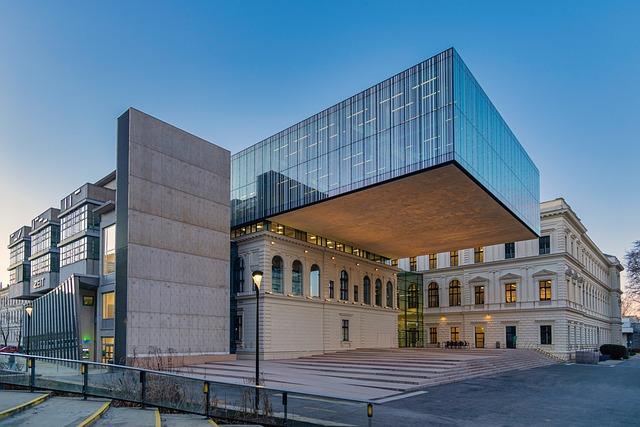Table of Contents
- Exploring the Vision and Mission of Gaia University
- Innovative Learning Approaches at Gaia University
- Integrative Programs and Their Impact on Sustainability
- Building a Global Community Through Gaia University
- Navigating Admissions: Tips for Aspiring Students at Gaia University
- Q&A
- In Retrospect
Exploring the Vision and Mission of Gaia University
At the heart of Gaia University lies a commitment to fostering a new paradigm in education, one that aligns with the principles of sustainability and holistic development. The university operates under the belief that education should be a transformative experience that empowers individuals to connect deeply with their values, communities, and the planet. This vision emphasizes an integrated approach, encouraging students to engage in meaningful work that has a positive impact on society and the environment. Through innovative programs and a collaborative learning atmosphere, Gaia University seeks to cultivate leaders who are equipped to tackle the complex challenges of the 21st century.
The mission of Gaia University is to provide a learning environment where knowledge is not merely acquired but actively co-created. This is achieved through a learner-centric approach that values personal growth as much as academic achievement. Key elements of this mission include:
- Interdisciplinary Learning: Students are encouraged to explore various fields and integrate diverse perspectives into their work.
- Global Citizenship: The curriculum is designed to foster a sense of responsibility towards local and global communities.
- Community Engagement: Practical experiences are prioritized, enabling students to apply their skills in real-world contexts.
Gaia University also places a strong emphasis on ecological sustainability, recognizing the urgent need for practices that promote a healthy planet. By embedding sustainability into every aspect of its operations, the institution aims to be a model for other educational entities. The following table outlines some of the core values that guide its mission:
| Core Values | Description |
|---|---|
| Responsibility | Encouraging accountability for personal, community, and environmental outcomes. |
| Innovation | Promoting forward-thinking solutions to contemporary challenges. |
| Collaborative Spirit | Fostering teamwork and inclusivity within the learning process. |

Innovative Learning Approaches at Gaia University
At Gaia University, education is reimagined through a tapestry of innovative learning approaches that prioritize personal growth and collective advancement. Instead of relying solely on traditional lectures, the university integrates a blend of hands-on experiences, collaborative projects, and self-directed learning. This multifaceted strategy encourages students to take charge of their education, fostering both independence and creativity. With an emphasis on real-world applications, learners are immersed in environments that challenge their thinking and expand their understanding.
The institution champions a community-centered pedagogy, inviting student engagement and peer-to-peer learning. Key elements of this approach include:
- Interdisciplinary Collaboration: Students from diverse fields come together to tackle complex problems.
- Mentorship Programs: Experienced professionals guide students through practical challenges.
- Participatory Workshops: Hands-on sessions encourage creativity and innovation.
Beyond traditional assessment methods, Gaia University utilizes cutting-edge technology to enhance the learning experience. For instance, the integration of digital platforms allows students to collaborate seamlessly across distances and access resources instantly. Further, with the implementation of data-driven evaluation tools, feedback is timely and relevant, helping students make meaningful progress. The focus on experiential learning is evident as they embark on a journey that blends knowledge and action, ensuring they are not just prepared for the workforce but are also equipped to effect positive change in society.

Integrative Programs and Their Impact on Sustainability
Integrative programs play a critical role in promoting sustainability by fostering a holistic approach to education and community development. These programs often emphasize interdisciplinary collaboration, drawing from various fields such as environmental science, social justice, and economics. By integrating knowledge and methodologies, participants develop a comprehensive understanding of complex sustainability issues, equipping them with the tools needed to implement effective solutions. Key areas of focus include:
- Collaboration Across Disciplines: Encouraging partnerships among students, educators, and community stakeholders.
- Real-World Application: Offering experiential learning opportunities that connect theory to practice.
- Systems Thinking: Fostering an understanding of interdependencies within environmental, social, and economic systems.
The impact of these integrative programs is multifaceted. They not only contribute to individual and community resilience but also inspire innovative practices that can be scaled for broader societal benefit. For instance, participants often engage in projects that address local environmental challenges while promoting social equity. This dual focus ensures that sustainability efforts are inclusive and effective. Highlighted impacts include:
| Impact Area | Description |
|---|---|
| Environmental Stewardship | Promoting conservation efforts and sustainable resource management. |
| Community Engagement | Building partnerships that empower local communities through education. |
| Policy Advocacy | Influencing sustainable practices at local and national levels. |
In sum, integrative programs are not just academic initiatives; they are catalysts for change, encouraging participants to think critically about sustainability challenges. By harnessing diverse perspectives and expertise, these programs cultivate a new generation of leaders equipped to navigate and address the nuances of environmental and social issues. Through continued investment in such holistic educational frameworks, we can collectively work towards a more sustainable future.

Building a Global Community Through Gaia University
At the heart of Gaia University lies a vision of creating a truly global community, where learners from diverse backgrounds unite to foster sustainable development and personal growth. This innovative institution transcends geographical boundaries, leveraging technology to facilitate collaboration and understanding among its members. Each participant is encouraged to share their unique perspectives, enriching the collective knowledge and skills that thrive within this interconnected network.
By engaging in immersive, project-based learning experiences, students not only acquire vital knowledge but also build meaningful relationships with peers worldwide. Key elements of building this vibrant community include:
- Collaborative Projects: Working together on real-world challenges fosters a sense of shared purpose and camaraderie.
- Diverse Perspectives: Exposure to various cultures and viewpoints enhances creativity and critical thinking.
- Open Communication: Encouraging dialogue among participants helps break down barriers and promotes understanding.
Gaia University’s unique approach to education is evident in its innovative programs that promote global citizenship. The following table illustrates some of the key areas of focus:
| Program Focus | Description |
|---|---|
| Sustainable Development | Empowering communities to create sustainable systems. |
| Global Leadership | Training individuals to lead change initiatives. |
| Cultural Exchange | Facilitating immersion experiences to learn from one another. |
Through these engaging initiatives, participants contribute to a vibrant global tapestry that celebrates diversity, fosters collaboration, and drives positive change. By nurturing this sense of belonging, Gaia University cultivates a lifelong commitment to learning, understanding, and contributing to a better world.

Navigating Admissions: Tips for Aspiring Students at Gaia University
Applying to Gaia University can be an exciting yet overwhelming journey. To stand out in the admissions process, it’s essential to prepare thoroughly. Begin by researching the university’s mission and values to ensure your goals align with theirs. This will not only help you craft a compelling personal statement but will also demonstrate your genuine interest in becoming a part of their academic community.
When it comes to your application, focus on showcasing your unique experiences and perspectives. Consider including:
- Personal Achievements: Highlight any significant accomplishments that reflect your dedication and passion.
- Community Involvement: Detail any volunteer work or community service that illustrates your commitment to making a positive impact.
- Relevant Skills: Discuss skills that are pertinent to your desired field of study, whether they are technical skills or soft skills like teamwork and communication.
Additionally, prepare for potential interviews or portfolio submissions. Practice common interview questions and present your work in a polished format. Below is a simple table summarizing key factors to consider during your preparation:
| Preparation Area | Tips |
|---|---|
| Research | Understand university values and culture |
| Personal Statement | Make it personal and reflective |
| Interview | Practice with friends or mentors |
Q&A
Q&A: Understanding Gaia University
Q: What is Gaia University? A: Gaia University is an innovative educational institution that emphasizes sustainability, social justice, and ecological literacy. It offers a unique approach to learning by combining experiential education with self-directed study, typically in a more flexible and community-oriented environment.Q: How does Gaia University differ from traditional universities? A: Unlike traditional universities that often follow a set curriculum, Gaia University encourages students to create their own learning paths based on their interests and passions. This model fosters a comprehensive understanding of complex global issues while promoting critical thinking and innovation.
Q: What programs does Gaia University offer? A: Gaia University offers a variety of programs focused on sustainability, permaculture, holistic health, and community development, among others. Students can tailor their educational journey to align with personal goals, whether through degrees, certifications, or research projects.
Q: Who can apply to Gaia University? A: Gaia University welcomes a diverse range of students from various backgrounds, including those seeking to deepen their understanding of ecological and social issues. Whether you’re a high school graduate or a seasoned professional looking to pivot your career, there’s a place for you at Gaia University.
Q: What are the learning methodologies employed at Gaia University? A: Gaia University utilizes a blend of methodologies, including project-based learning, collaborative workshops, and mentorship programs. This approach allows students to engage deeply with real-world challenges while developing practical solutions and skills.
Q: How does Gaia University foster community involvement? A: Community involvement is a cornerstone of Gaia University’s philosophy. Students are encouraged to engage with local and global communities through service-learning projects, internships, and networking events, which help them apply their knowledge in meaningful ways.
Q: What kind of support do students receive? A: At Gaia University, students benefit from a comprehensive support system that includes mentors, personalized academic guidance, and access to a rich network of professionals within the sustainability field. This supportive framework helps students navigate their unique educational journeys successfully.
Q: Is Gaia University recognized or accredited? A: Gaia University operates as a non-traditional educational institution and does not pursue conventional accreditation. However, its programs are designed to provide students with valuable skills and knowledge recognized within the sustainability sector and beyond.
Q: What are the benefits of studying at Gaia University? A: Students at Gaia University enjoy a personalized educational experience that empowers them to become change-makers in their communities. With a focus on sustainability and global awareness, graduates are well-equipped to tackle the pressing challenges of our time and create a positive impact in the world.
Q: How can prospective students learn more about Gaia University? A: Prospective students can explore Gaia University further by visiting their official website, attending informational webinars, or engaging with current students and alumni through social media platforms. This engagement will provide a deeper insight into the university’s culture and opportunities.—This Q&A aims to provide clarity on what Gaia University represents while highlighting its unique features and benefits for potential students.



0 Comments